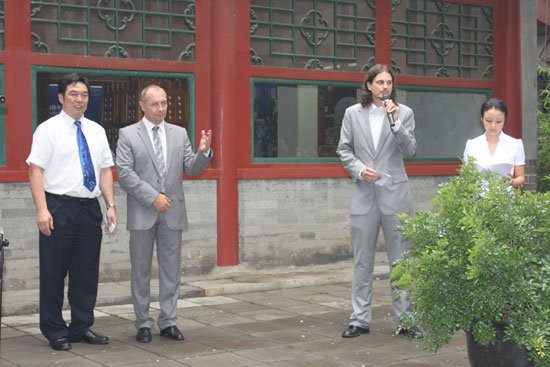Czech astronomy exhibit opens, cooperation follows
Three hundred years ago, Czech astronomer Karel Slavíček studied and expanded upon Chinese astronomy in the Beijing Ancient Observatory. Today, in the very same observatory, an exhibit highlighting his contributions to the field is on display.
Dr. Jing Hairong, vice director of the observatory, welcomed Czech ambassador Libor Sečka to the opening ceremony of the exhibit Monday.
He quoted Confucius and said, "'It is always a pleasure to greet a friend from far away.' Today we have lots of new friends and welcome many old friends."
Slavíček, an astronomer and mathematician from Jimramov (today's Czech Republic), came to Beijing from Lisbon, Portugal as a Jesuit missionary in 1714.
"Slavíček was on a mission; not only in the real sense of the word as a religious missionary, but also on a mission of creating a bridge between the cultures of Europe and China," Sečka said in his opening speech.
In 1722, many Jesuits were expelled to Canton, China, but Slavíček's scientific merit allowed him to stay in Beijing. He defended Chinese astronomy, especially the sixty-year cycle, which is the basis of the Chinese calendar, and said that China was the most educated and civilized nation of his time.
The exhibit, which shows Slavíček's translated letters and works, will be on display in the second hall of the observatory for the next three months.
Veronika Musilová, third secretary of the Embassy of the Czech Republic to China, said that the exhibit took several tedious months to complete. She said she hopes the exhibit will spark interest in others to visit observatories in the Czech Republic and harbor more Czech-Chinese cooperation.
Dr. Jing said this was the first time that the observatory had completed a project with the Czech embassy and that it was a good start to future scientific cooperation.
"China is a newly developing county," he said. "I hope that through our efforts we can continue… to make the dream, 'one world, one dream,' come true."
Sečka said that he hopes this project will lead to discussions on other topics such as environmental issues, transportation, and conservation of monuments.
"Beijing and Prague are very different cities," he said. "Our goal is to see how they can be complementary to each other."
 0
0 








Go to Forum >>0 Comments